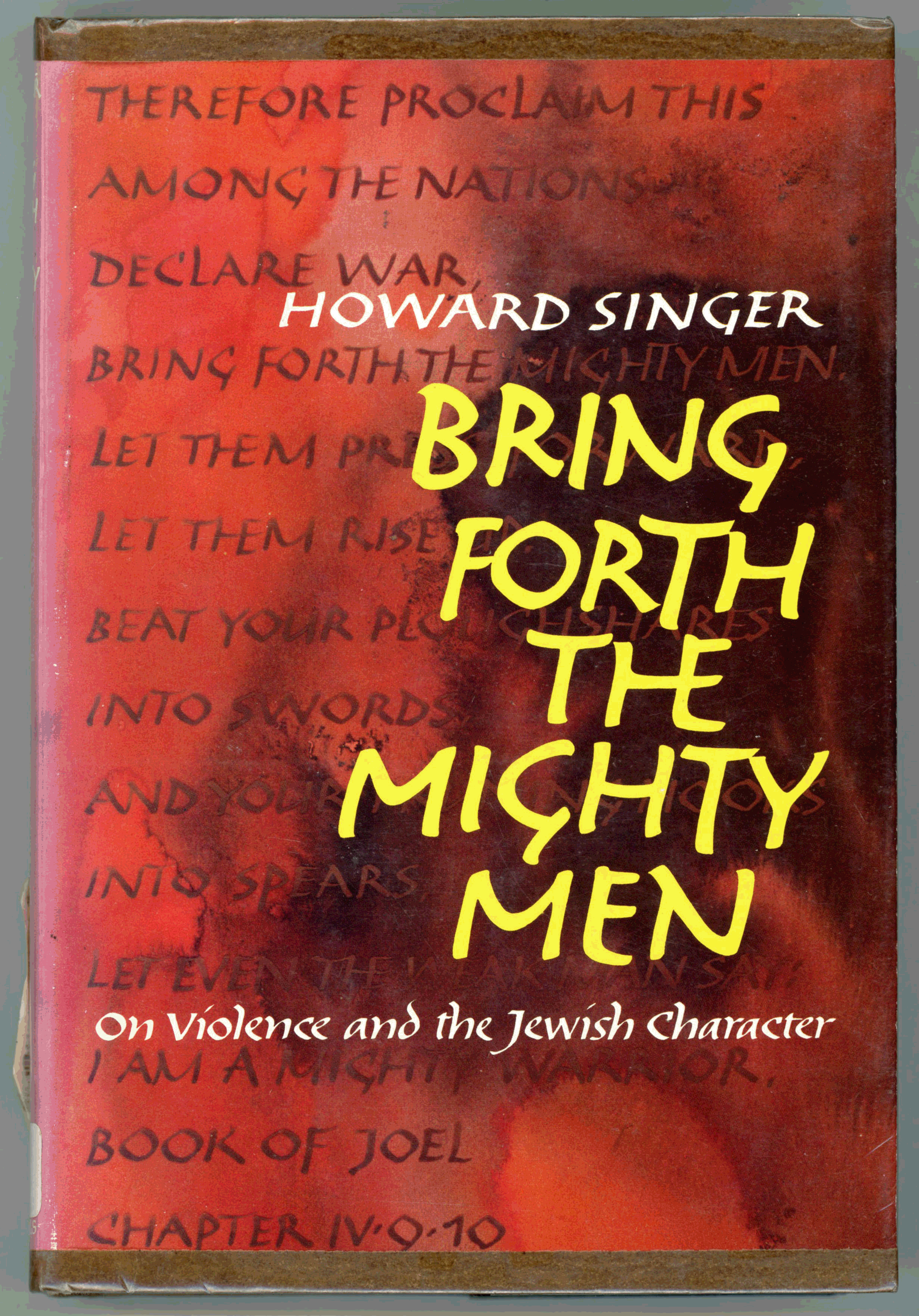Bring Forth the Mighty Men – On Violence and the Jewish Character
by Howard Singer
Funk and Wagnalls – 1969
The immigrant’s son saw liberalism as America’s secular, non-sectarian religion;
he hoped that espousing it would make him part of America
even more effectively than showing affection for baseball.
The Jewish intellectual found a way of rationalizing his abandonment of Jewish loyalties by seeing it, not as desertion, but as moral growth.
By professing a vague humanism or universalism,
he could justify, at least to himself, casting off the particular.
This has not changed much in thirty [fifty-four] years.
 American Jewry has come to think of itself as comfortable, as solidly middle class, which, at the moment [1969], is a fair description. But things were not ever thus. American Jewry’s present economic and social status is something it has achieved quite recently.
American Jewry has come to think of itself as comfortable, as solidly middle class, which, at the moment [1969], is a fair description. But things were not ever thus. American Jewry’s present economic and social status is something it has achieved quite recently.
Jews – like other immigrant groups – had a difficult time adjusting to the United States. America did not really welcome the tired, the poor, “the huddled masses yearning to be free,” except in ideology and the history books. In reality labor saw those huddled foreigners in the steerage of immigrant ships as a threat to employment, and the upper classes saw them as an undigestible mass that threatened the dominant culture.
Until the beginning of the Second World War it was enormously difficult for a Jewish student to enter a decent college, a medical school, or a law school. It was almost useless for a Jewish student to study engineering; his chances of getting a job in his field were almost nil. Jews found it impossible to find jobs with the public utilities, for instance, or with banks. During the Depression Jewish girls learned to wear a crucifix when they sought jobs; without camouflage they would be turned away.
American anti-Semitism developed a wide variety of rationales. Much of it was crudely fundamentalist in tone: The Jews killed Jesus, didn’t they? But in the late twenties and early thirties it became part of the genteel style. T.S. Eliot, F. Scott Fitzgerald, and Thomas Wolfe established the Jew as a symbol of the commercial blight that was dehumanizing society, as a convenient literary device to designate the quintessential vulgarian. But the most threatening variety of anti-Semitism was neither literary nor rural; it was pitched at a lower-middle-class urban audience, and it was fearfully effective. It was Father Coughlin, the Catholic radio priest, spewing weird lies about the Jews to a nationwide radio audience every Sunday. It was Ford’s newspaper, the Dearborn Independent. It was Charles Lindbergh – good old Lindy, the Lone Eagle – warning the nation in a speech from Des Moines, Iowa, that the Jews were trying to drag the country into war with Germany. It was seeing Americans in storm trooper uniforms at rallies of the German American Bund in New York City. Most middle-aged Jews have deliberately wiped those years out of their minds. It was an ugly, frightening time, and ordinary Jews in this country had good reason for apprehension.
Of course, there were also extraordinary Jews: a minority of wealthy Jews, mostly of German background, far removed from the pain and lower-class squalor in which most Jews lived. But they were, in fact, the heart of the target; the anti-Semitic propaganda was directed at the “Jews on Wall Street,” the Rothschilds and “the international Jewish money conspiracy.” One wonders how safe they felt.
The Second World War changed things. Suddenly the country found that it needed more doctors and engineers and welders, even Jewish doctors and engineers and welders. And when the war was over and the economy continued to expand, there seemed to be room for everybody, even Jews, even – here and there in a modest way – even Negroes. But long before that the Jew had learned to walk softly in the country in which he was, theoretically, a first-class citizen. He had learned the right tones in which to ask for rachmonis, and the appropriate posture when asking. And, most important, his sense of identity had begun to fade.
Jewishness is a complex thing, full of all sorts of drives and values and loyalties; the immigrant’s son reduced it to something less troublesome, to a purely religious definition, a kind of Jewish Methodism with emphasis on ethics. The immigrant’s son saw liberalism as America’s secular, non-sectarian religion; he hoped that espousing it would make him part of America even more effectively than showing affection for baseball. The Jewish intellectual found a way of rationalizing his abandonment of Jewish loyalties by seeing it, not as desertion, but as moral growth. By professing a vague humanism or universalism, he could justify, at least to himself, casting off the particular. This has not changed much in thirty [seventy-nine] years. In the summer of 1968, George Steiner, who teaches at Cambridge University, attacked “the barbarism of blind loyalties” and urged all men to “free themselves from the myths of nationalism and proclaim that whereas trees do indeed have roots, human beings have legs with which to move freely among each other.” During the same panel discussion, an Israeli writer, Matti Meged, remarked that indeed human beings do have legs, and that the Jewish people had most often used them for running away.
______________________________
 ______________________________
______________________________
The dirty little secret about middle-aged American Jews, especially those on the highest economic levels, is that many dream of being reincarnated as Episcopalians. Some are not content with dreams; the Jewish chief of a TV network may actually convert; the wealthy families mentioned in Stephen Birmingham’s Our Crowd intermarry and have few Jewish descendants. But for most Jews so afflicted actual conversion represents too great a wrench. Many find consolation by fleeing from that which is recognizably Jewish toward such neutral interests as Ethical Culture and Zen Buddhism. Their personality patterns are precisely the same as those designated by the epithet “Uncle Tom.” Jews have not as yet developed a striking, characterizing name for them, and so, since I need one for this little effort at description I will invent one: Cousin Merwyn.
Why Merwyn? Because the chances are that Merwyn’s Hebrew name was Mosheh, Moses, which makes the contrast perfect. Moses, brought up as an Egyptian prince, voluntarily cast his lot with the Jewish people. But that name was considered “too Jewish” by ambitious immigrant mothers, and so they began naming their children Moe, or Morris. The Morrises evolved into Marvins, Miltons, and Myrons, and eventually into that pinnacle of gentility, Merwyn. If we were to measure Jewish attitudes ranging from self-respect through bare self-acceptance to self-hatred, it would be appropriate to put Moses at one end of the scale and Merwyn at the other.
It is easy to recognize Cousin Merwyn. He is the fellow who dismisses an anti-Semitic joke as good-humored but thinks it bad taste for a Jew to tell a funny story about a minister or a priest. He averts his eyes in embarrassment when he sees a Jew carrying a lulav on Succoth, but he is touched and respectful when he sees Christians carrying a similar object on Palm Sunday. Jews at a Bar Mitzvah strike him as loud and vulgar, but he thinks Italians having a good time at a wedding are happily picturesque.
Every Jew knows at least one Cousin Merwyn. I know dozens.
Merwynism, by the way, is not new; it is the classic Jewish malady. There is a passage in Wayikra Rabbah, a seventh-century collection based on much older material, that reads as follows: ‘The Israelites were redeemed from Egypt because they did not change their Hebrew names; as Reuben and Simeon they went down into Egypt and as Reuben and Simeon did they withdraw. They did not call Reuben, Rufus, nor Judah, Julian, nor Joseph, Luke.’
Here we have the echo of an ancient Jewish loyalist’s protest against the pressures of assimilation. The Latin names indicate that he was preoccupied, not with the Israelites in Egypt, but with the Israelites in his own period: the Roman conquest. But the poor fellow was fighting the tide; a small, intelligent, conquered minority instinctively acquires the style of the conquerors.
Cousin Merwyn, I’ve discovered, comes in two models: Merwyn Outside and Merwyn Inside.
Merwyn Outside will have nothing to do with anything Jewish. This gives him no problems whatever. In the United States there are dozens of substitute faiths and movements to suit every taste, from staid Unitarianism to the radical lunatic fringe. Merwyn Outside is usually most comfortable with a thoroughly secular, humanist liberalism. As a political theory, liberalism is aloof and pragmatic, but Merwyn Outside will often invest it with the fervor his Orthodox grandfather displayed when dancing in the synagogue at the Rejoicing of the Law. Unlike a liberal of Presbyterian background, Merwyn Outside has to put all his emotional energy into his liberalism; he has nowhere else to expend it. It will have to serve as his kinship and culture group, his ethnic and religious orientation, his hope of heaven and his social milieu. That’s quite a lot to ask, even of Americans for Democratic Action.
Merwyn Outside yearns to transcend his parochial origins, and goes to great lengths to succeed. He may even be pro-Arab to prove his “objectivity.” But in truth, he never considers such problems on their merits. The word “Jew” touches a live nerve, triggers a reflex, and flips him onto the anti-Jewish side of any issue.
Merwyn Inside suffers from the same malady, but in another form. He, too, will flee his Jewishness, but his flight is disguised. His technique is to take the Jews with him, to make Jewish life less recognizably Jewish. He will join a synagogue, but suggest innovations in the religious service that make it untraditional in spirit. When they are made he will not attend anyway. He will send his child to Sunday school, and perhaps join the religious school board, but he will oppose raising the educational standards on the grounds that the children are overburdened with Public School work. He will convey the insignificance of Sunday School to the child by pulling him out of classes for Little League games. With a sparkling conscience, and always in the name of “progress” or good fellowship, he will vulgarize and corrode the institutions of Jewish life.
Merwyn Outside is merely a dead loss to the Jewish group, but Merwyn Inside is a galloping disaster. For Merwyn Inside is often wealthy, energetic, and willing to work. These qualities soon bring him into positions of influence and authority. And if American Jewish organizations have lost touch with Jewish needs, it is because Merwyn Inside dominates those organizations.
B’nai B’rith, one must remember, was established in 1843; the American Jewish Committee in 1906; the American Jewish Congress in 1917 and reconstituted in 1922. Organizations need rich men on their boards of directors, and so the leadership they attracted came from the half-assimilated, upper periphery of Jewish life. Such men resented being kept out of wealthy country clubs and exclusive hotels, and they set their organizations to the task of solving such problems. They were preoccupied with “winning friends” among the gentile community at any cost. That set the style for American Jewish organizations, and ever since ordinary American Jews have paid a high price in self-respect.
